Key to the Straits. H. 1
But the operation could only be realized if there was complete strategic and operational surprise, as well as competent leadership of the actions of the allied forces. However, force the Dardanelles by forces of one fleet (as originally planned) it turned out to be impossible and it was subsequently necessary to carry out a combined land-sea operation, the success of which was possible only with careful interaction between the fleet and the landing force, skillful leadership of the command in an environment of increased complexity.
Dardanelles-Gallipoli Entente operation 19 February 1915 - 9 January 1916 was closely connected with the Bulgarian-Greek issue and the final success of this most important strategic operation of the First World War depended on the outcome of the struggle for the position of Bulgaria and Greece.
Thus, already in preparation for the operation, the Supreme Military Council of Great Britain decided to disembark (together with the French) troops and create bases on the Greek islands of Imbros, Tenedos and Lemnos. Equally important was attached to the position of the most powerful Balkan state bordering on Turkey - Bulgaria. It was precisely the influence of the regional Balkan powers that was of decisive importance for resolving the issue of nationality of the key geo-strategic point of Eurasia - the Bosphorus and Dardanelles.
Greece and its role in the diplomatic training of the Dardanelles operation.
The position of Greece largely pushed the British command to organize the Dardanelles operation. Greece provided allied forces with island infrastructure during the operation. At the same time, the position of Bulgaria significantly influenced the timing and parameters of the implementation of the operation.
Ideally, the allies tried to win over both Balkan states to their side.
But without a settlement of the Serbian - Bulgarian - Greek conflict arising from the outcome of the Balkan wars, this was unlikely. Attempts to overcome the last diplomats of the Entente were undertaken both on the threshold and during the Dardanelles operation.
During the preparation of the operation, British Foreign Secretary E. Gray 23. 01. 1915 offered Greece (in exchange for active assistance to Serbia, the Allied Entente) territorial acquisitions in Asia Minor. At the same time, Bulgaria was assured that if the claims of Serbia and Greece were satisfied, then the Bulgarians would receive compensation - in Macedonia.
Greek Prime Minister E. Venizelos called the proposals "ridiculous", and in the memorandums of 24 and 30 in January 1915 to King Constantine insisted on the immediate entry of Greece into world war: the ideal goal was to create a neo-Byzantine empire. The capital of the empire - Constantinople - became a stumbling block for England, France, Russia and Greece.
British diplomacy D. Lloyd George and Winston Churchill, even during the war, was directed against their allies - France (indirectly) and Russia (directly). But, since the acute inter-allied conflict was fraught with the victory of the German bloc, they tried to avoid it - the British tried to use the interests of the Balkan countries as a “bargaining chip”.
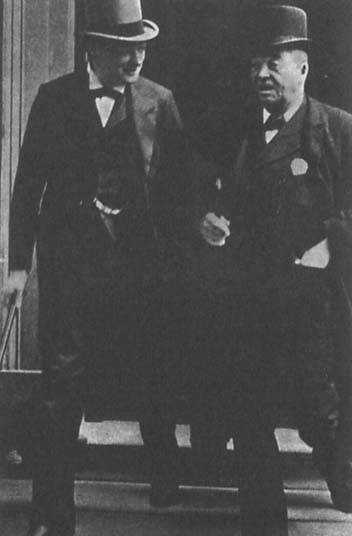
First Lord Admiralty Winston Churchill and First Sea Lord D. Fisher.
In fact, this was the first inter-allied conflict that emerged during the First World War - and it concerned the solution of the question of the fate of the Ottoman Empire. Its essence was whether the Straits and Constantinople would “internationalize” or they would go (along with the interests of France and England) under the power of Russia.
D.Lloyd George
In addition to the conflict between France and England with Russia, there was also a conflict between France and England - it was highlighted brightly after the victory over "German militarism" and was an echo of the previous historical competition between these powers in Europe and the world.
It should be said that if French diplomats in Constantinople (to a lesser extent) and in the Balkans (to a greater extent) got used to focus on Russian policy quite a long time ago, then for British diplomats, for whom the fact of Russian-English rapprochement was unusual, it was natural to preserve their own As a rule, anti-Russian contacts with the Balkan states.
Yes, and the weight of the Entente powers in different Balkan countries was not the same. Of the 3 historical patron powers of Greece - France, England and Russia - 2 was the first, despite the fact that they objectively played less than Russia in the role of Greece achieving independence, but for various reasons, they had a dominant position in Greece. France was interested in Serbia only in terms of loans and arms orders, while England was even less interested in Serbia. Bulgaria from 80-90's XIX century. became a field of struggle for both Austrian and Russian, as well as English and Russian influence - this country, according to European politicians, was assigned the leading role on the peninsula.
And the heterogeneity, if not the hostility of Russian and English politics, manifested itself in Greece and Bulgaria (Serbia had already participated in the war) - which was very out of place on the eve of the fateful Dardanelles operation. Both Russia and England understood the importance of the Balkan theater, considering the most desirable restoration of the Balkan union. But the latter should have been directed (above all) against Austria (Russia's point of view) and against Austria, Germany and Turkey (in the long run and against Russia) (England's point of view). Competing among themselves, the Entente powers lost (primarily in Bulgaria) a significant share of their influence, yielding to the positions of Germany and Austria.
Another aspect that predetermined the dull struggle of England and Russia (with France on the side of England) was the question of the fate of the Ottoman Empire and Constantinople.
Constantinople France was interested more than the Straits. She was interested not so much in the problem of the Straits in the narrow sense of the word (i.e., the right of Russia to carry out trials through the Straits without obstacles), as in the question of the defense of Constantinople (in which serious French interests were present) from both English and Russian domination.
England, on the contrary, could be more indifferent to Constantinople than to the Straits - although the question of the Straits did not belong to the number of "primary" affecting its interests, but this did not mean that she, as the mistress of the seas and the colonial dominion of that time, was ready to contemplate accession in the Straits of Russia, which received the possibility of a free exit of its fleet from the Black Sea.
According to the British, the role of a hostile to Russia "gatekeeper of the Black Sea" instead of a decaying Turkey, was best suited by the Bulgarians - the strongest, most energetic and viable nation of the Balkan Peninsula.
But the unrestrained policy of the government of Tsar Ferdinand of Bulgaria laid upon Bulgaria the responsibility for the inter-allied Second Balkan War, and this spread the attention of British politicians between Greece and Bulgaria - especially since Greece was also a maritime power of the eastern Mediterranean, especially useful during the Dardanelles operation.
Therefore, Greece, which had a fleet and dreamed of capturing the Gallipoli peninsula, and Bulgaria, which had the strongest army in the Balkans, were desirable allies of the Entente.
Russian diplomacy believed that the assistance of Bulgaria, regardless of the outcome of the war, could be ensured by transferring the Macedonian territories to Ishtib and Kochan (to Varadar) to this state, and in the event of a victorious war Bulgaria receives the so-called disputed territory provided for by the Serbo secret application - the Bulgarian Treaty of February 2 29 - from the top of the Golem, north of the Curved Palanca, to the Ohrid Lake (with the inclusion of the Struga).
Serbia had to guarantee these provisions.
But the Greeks and Serbs opposed the territorial concessions to Bulgaria.
As early as September 1, Serbian Prime Minister N. Pasic categorically refused any concessions, until the Entente powers guaranteed Serbia "Serbian-Croatian lands with an adjacent coast", which at this stage of the war was obviously impossible, both on the basis of the current situation on the fronts, and because of the danger of alienating Italy from the Entente by providing Fiume and Dalmatia with Serbia.
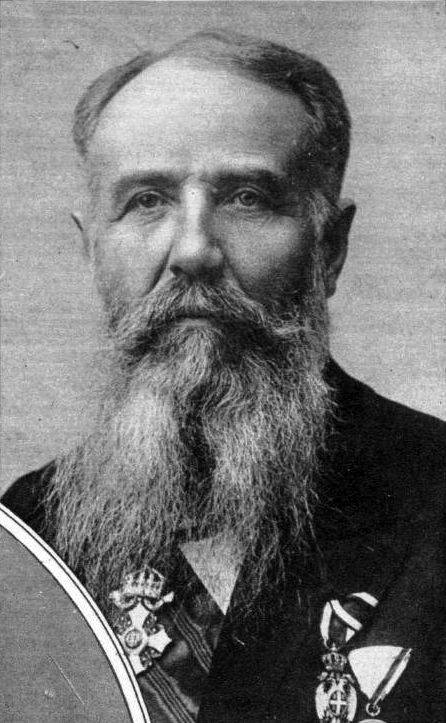
Nikola Pasic
The British Foreign Ministry believed that the Entente powers should limit themselves only to an indication of the desirability of compensation in favor of Bulgaria, leaving the Balkan states themselves, mutual negotiations, to determine their size. It is obvious that it was impossible to count on voluntary concessions from Serbia. In relation to Greece, E. Gray declared guarantees against the attack on her by Bulgaria, not realizing that the Greek government, reassured by such assurances, did not even want to make concessions to Bulgaria.
Thus, according to S.D. Sazonov, England was largely responsible for such an outcome of the negotiations - having a war against Germany and Austria, it is impossible not to strive to avoid a clash with Turkey and Bulgaria due to the recklessness of Greece, relying on the connivance of the British .
Such a situation arose on the eve of the storming of the Straits - the Allies could not even diplomatically prepare this operation.
About how the political situation was seen in the event of the beginning of the Dardanelles storming is shown by four views of W. Churchill, which he took into account when preparing the operation:
1) the appearance of the English fleet before Constantinople should have caused a rebellion of the Greek and Armenian population of Turkey and a movement among the Muslims themselves against the Young Turk government;
2) begins the "inevitable" movement of the Bulgarians to Adrianople;
3) Russia would consider itself forced, no matter how difficult the situation on the Austro-German front would be, to take part in placing a cross over the temple of St. Sophia — that is, would help England complete the task of seizing the Straits and Constantinople (at the same time not having enough strength to take the dominant position here);
4) in the event of the fall of the Turkish forts in the Dardanelles, Greece joins the Entente, handing over its armed forces to the British.
Of course, to a large extent this was not a political calculation, but the dreams of British politics about the ideal development of the situation.
The last premise contains the key to understanding the essence of the Dardanelles operation in its early phase. British troops, used as a landing force, were to have a "moral effect" on Greece and involve it in the operation.
It was the acquisition of such a profitable geopolitical ally as Greece was the most important goal of the operation in the Dardanelles for the British.
Thus, initially the essence of the Dardanelles operation was conceived in the capture of Greece (with the support of England) by the Straits and Constantinople (with the internationalization of the latter), while England, by demonstrating and supporting the Greeks in the Straits, gained control over the oil regions of the Middle East.
In fact, the Dardanelles operation was carried out against Russia - more precisely, against the establishment of its dominion in the Straits.
This explains the sudden change in the mood of E. Venizelos, when he already 24 January 1915 passionately argued to the king that Greece should immediately take part in the war and not only give up, for the sake of bringing to the cause of Bulgaria, from opposing the Serbian concessions in Macedonia, but and most voluntarily give up Kavala. His memorandum, submitted to the King of January 30, was devoted to territorial acquisitions in Asia Minor and the hope that the territory of Greece would be doubled in the future.
Greek Prime Minister E. Venizelos
At the same time, S.D. Sazonov informed the British that Russia would not prevent the occupation of Gallipoli by Greece - but on the condition that the French and British governments take measures to prevent Greece from opposing Russian policy and Russian interests on the Straits. The Russian reservation, supported by France, greatly disappointed the Greek government.
Minister of Foreign Affairs of the Russian Empire S. D. Sazonov.
The negotiations of England, France and Russia in Athens on February 14, carried out to stimulate Greece to come to the aid of Serbia (in connection with the sending of two allied divisions, supposedly guaranteeing it against the attack from Bulgaria), showed that the 2-multiple theory the increase of the territory before the practical execution of acquisitions is a great distance, and without the consent of Russia, which did not want to allow the Greeks to Constantinople, but ready to draw its armed forces into the struggle with Austria, it will not be possible to resolve the issue. As a result, E. Venizelos refused the entry of Greece into the war - and this refusal, as stated, will be valid until the Entente succeeds in winning over Romania. The Greek Prime Minister called the entry of Greece into the war on the conditions indicated by the allies "an act of madness."
The following thoughts expressed at the meeting of the British Military Council 26, February 1915, on the importance of the Balkan Peninsula for the case of the Entente, consider the role of the main theaters of military operations that have developed by this time:
1. Russia. We should not expect that Russia in the coming months will be able to successfully invade Germany. However, it can be expected that it will link and hold up very significant German forces on its front. There is no reason to assume that Germany will be able in some time to transfer to the west about 1 a million fighters it needs against Russia.
2. Anglo-French positions on the French front are very strong, and cannot be subjected to bypass traffic. The allied positions and forces in France are incomparably more significant than at the beginning of the war. Therefore, the Allies should welcome any German offensive of the largest scale. The chances of repelling it will be favorable - but even if it would have been necessary to retreat to other positions, larger losses for the Germans than those of the allies would represent good compensation. Moreover, four or five British divisions could not decisively influence this result.
3. The Balkan Peninsula is the decisive point, and the only point where it is possible to seize and save the initiative. Provided that there is a corresponding interaction between the land and sea forces and with the available forces, there is confidence that they will be able to capture Constantinople at the end of March 1915 and destroy the Turkish forces in Europe (except those located in Adrianople). This blow can be delivered before the fate of Serbia is decided. His success could have a decisive influence on the situation in the Balkans. He could destroy Turkey as a military force.
The Allies also noted that the troops required for the operation could be concentrated at the Bulair Isthmus (on the Gallipoli Peninsula) by March 21 1915 - if the maritime operation does not lead to success, they can be used on the Gallipoli Peninsula and to ensure the advancement of the fleet. Once the Dardanelles are open, these troops will be able to: a) operate at Constantinople; or b) if Bulgaria takes the side of the Entente and decides to occupy the territory up to the Enos-Midia line, they will be able to pass through Bulgaria to the aid of Serbia; or c) if Bulgaria maintains friendly neutrality, but Greece enters the war, they will be able to advance through Thessaloniki to the aid of Serbia.
Moreover, at this stage E. Venizelos, who feared that England would find the necessary foothold for the Dardanelles operation in Bulgaria, on March 1 suggested sending three Greek divisions to the Dardanelles.
After the next Anglo-Greek negotiations, the British, interested in supporting the Greeks (after the Russian demarche lost interest in the operation) of their fleet, offered them the “principle of internationalization” as a possible option to determine the future fate of Constantinople.
In fact, it was about the "internationalization" of an entire state controlled by the victorious powers. The Greeks were given a transparent hint at the possibility of the appearance of the Greek prince in the role of High Commissioner in the "internationalized" Constantinople.
But 2 March, 1915, a cold water tub over the heads of the Greeks, and not only the Greeks, became the phrase of S. D. Sazonov, that "under no circumstances can we allow the participation of Greek troops in the entry of Allied forces into Constantinople."
E. Gray drew the attention of the Russian colleague to the importance of forcing the Dardanelles to influence all Balkan states and noted that the Admiralty, for technical reasons, attaches great importance to the Greek fleet, stating that “to prevent Greece would mean to slow down the events greatly”.
On March 5, a regular meeting of the Greek Council was held, at which the size of the Greek airborne detachment was reduced from three to one division. It was also noted that Greece has no plans for Constantinople and the Greek troops, who entered the Ottoman capital, will leave it, having limited themselves to visiting the church of St. Sophia.
As a result, S.D. Sazonov, on March 6, declared to the British ambassador to Russia, D. Buchanan, the position of the emperor - that under no circumstances would he give his consent to any sea or land operations of the Greek armed forces in the Straits.
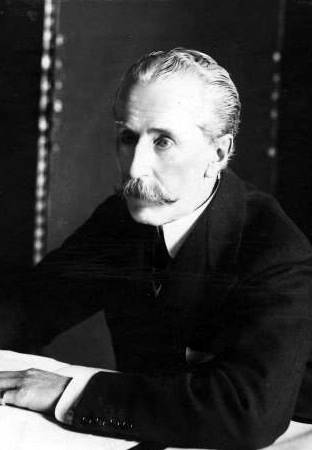
British Ambassador to Russia D. Buchanan
Russia agreed to allow the Greeks to conduct military operations in the Smyrna region, but this agreement was accompanied by four conditions that were quite difficult for Greece: 1) so that Greece itself offered its assistance in the Dardanelles operation, and was not invited by the Entente; 2) Whatever the results of the operation in the Straits, Greece will not receive any territorial compensation either in southern Thrace or near the Straits; 3) The military operations of the Greek army should be limited to those areas that will be established by the Allied Command; 4) the Greek army under no circumstances should join Constantinople.
As a result, the king of Greece refused to endorse the initiative of E. Venizelos, sending him to resign.
To be continued
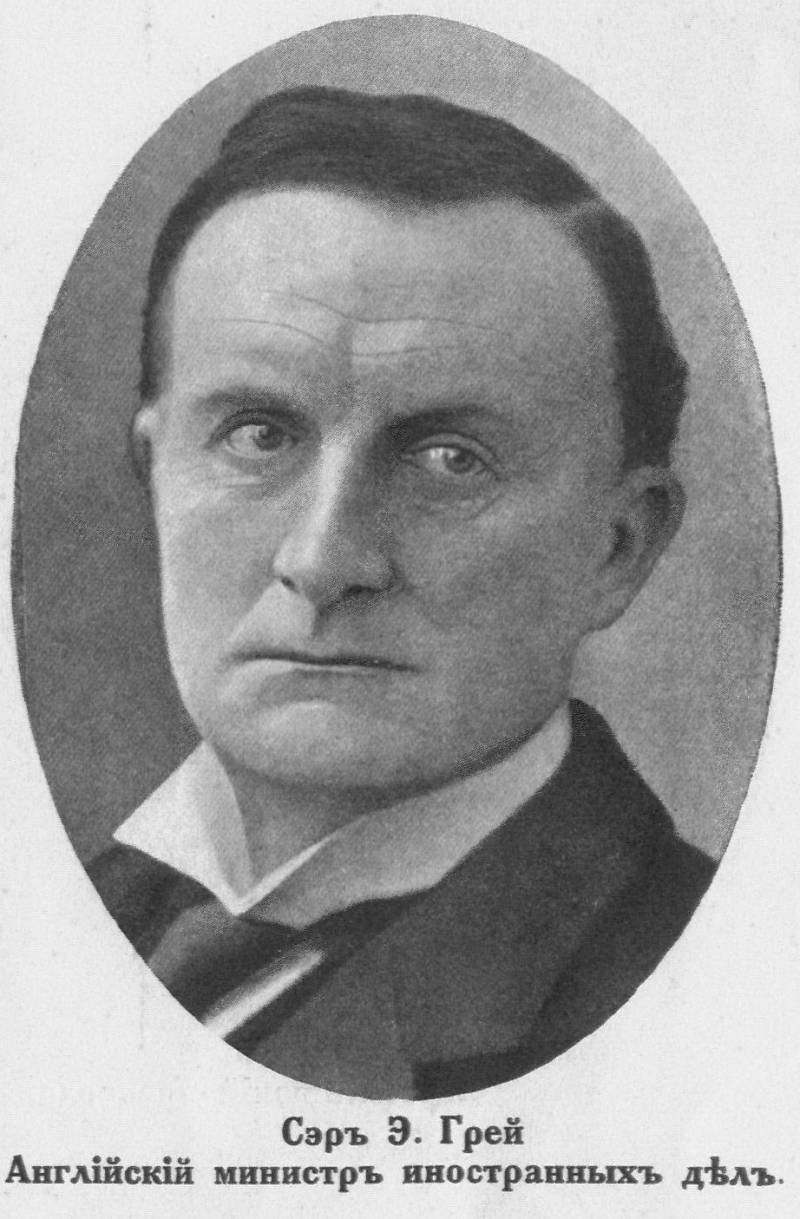
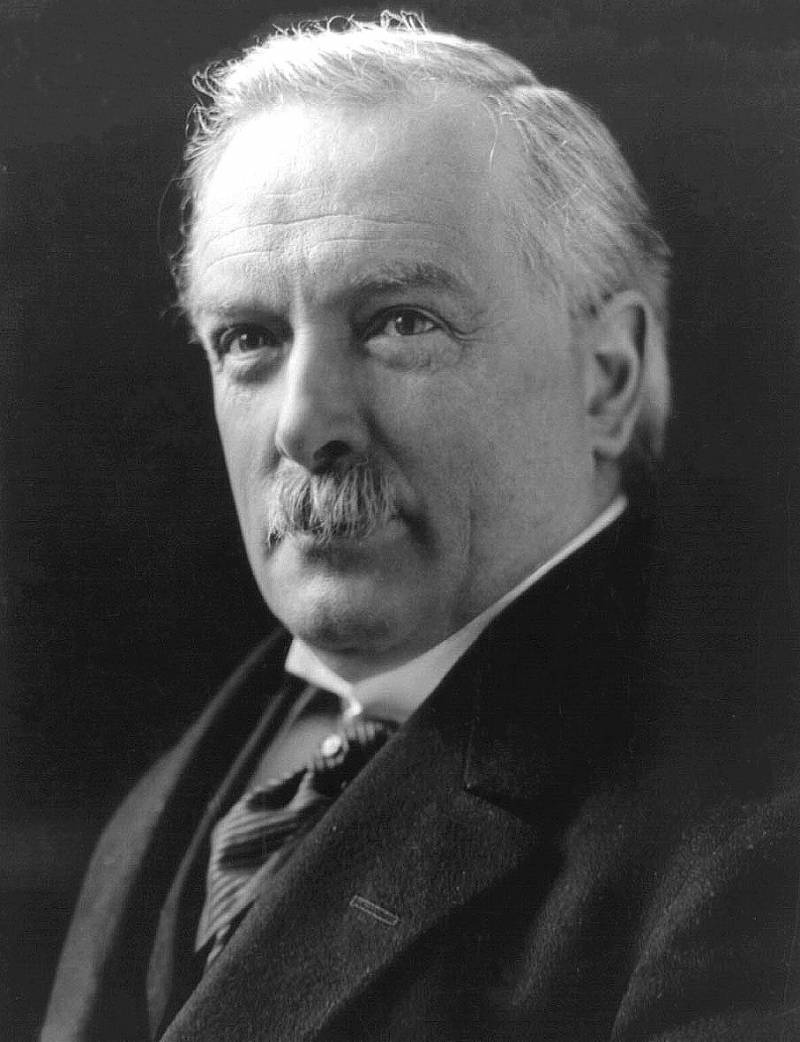
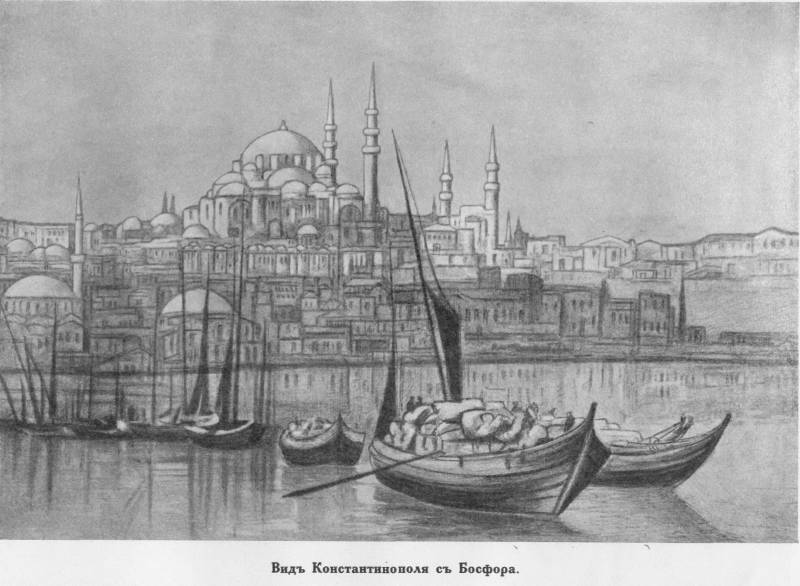
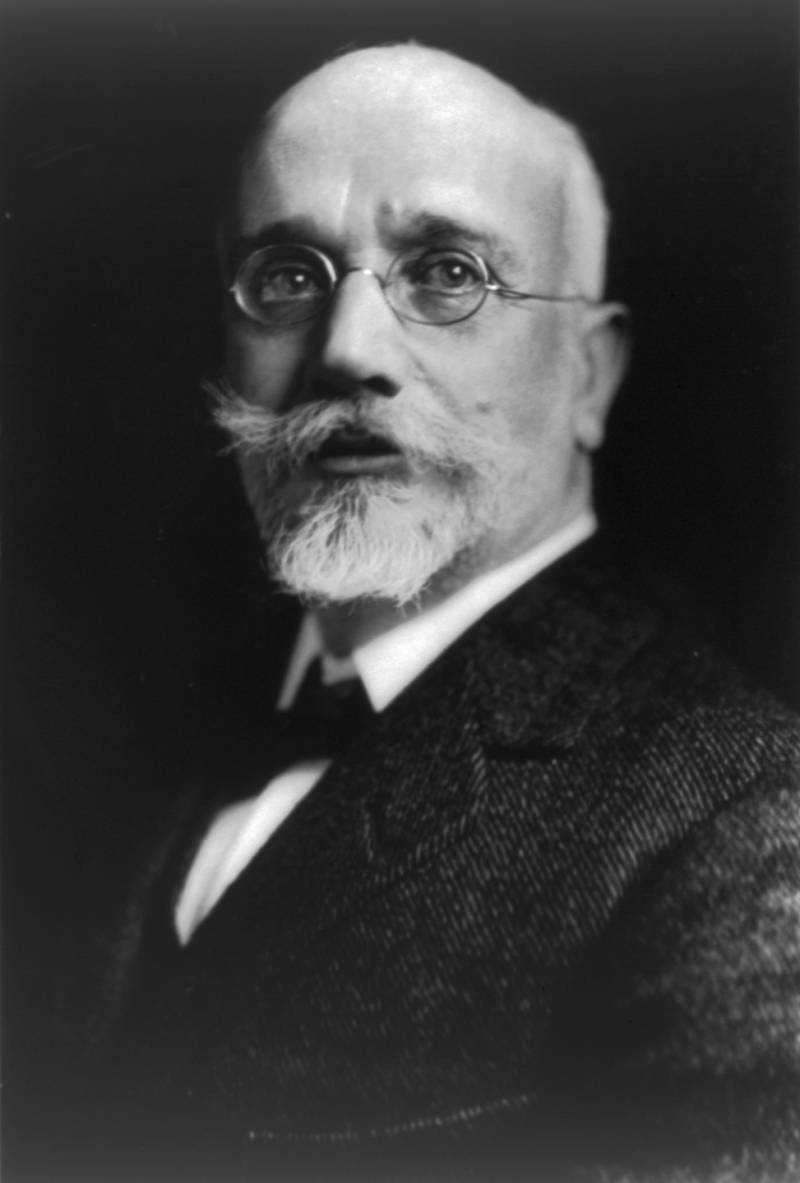
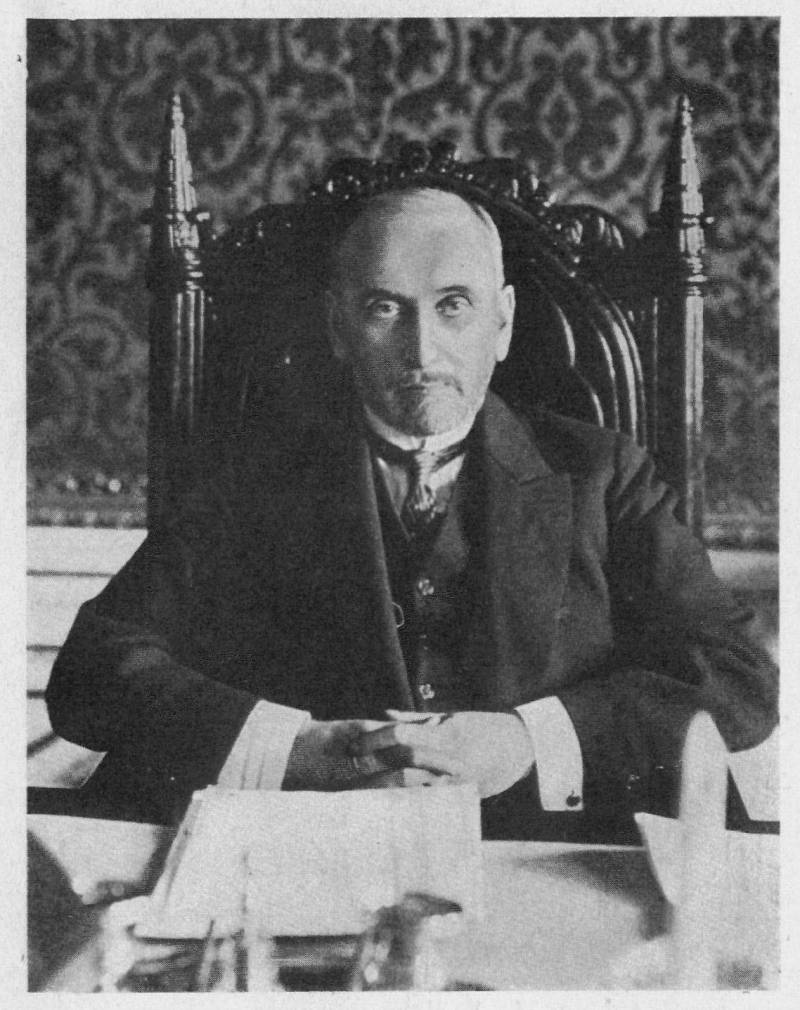
Information